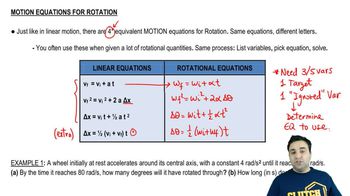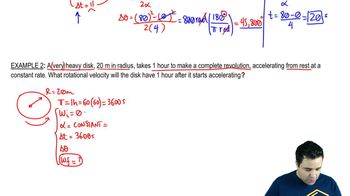12. Rotational Kinematics
Equations of Rotational Motion
Learn with other creators
Practice this topic
- Multiple Choice
A tiny object spins with 5 rad/s around a circular path of radius 10 m. The object then accelerates at 3 rad/s2. Calculate its angular speed 8 s after starting to accelerate.
BONUS:Calculate its linear displacement in the 8 s.
1841views16rank3comments - Multiple Choice
The turntable of a DJ set is spinning at a constant rate just before it is turned off. If the turntable decelerates at 3 rad/s2 and goes through an additional 30 rotations before stopping, how fast (in RPM) was the turntable initially spinning?
BONUS:How long (in seconds) does the turntable take to stop?
1728views18rank8comments - Textbook Question
A high-speed flywheel in a motor is spinning at 500 rpm when a power failure suddenly occurs. The flywheel has mass 40.0 kg and diameter 75.0 cm. The power is off for 30.0 s, and during this time the flywheel slows due to friction in its axle bearings. During the time the power is off, the flywheel makes 200 complete revolutions. At what rate is the flywheel spinning when the power comes back on?
2683views - Textbook Question
An electric fan is turned off, and its angular velocity decreases uniformly from 500 rev/min to 200 rev/min in 4.00 s. How many more seconds are required for the fan to come to rest if the angular acceleration remains constant at the value calculated in part (a)?
2779views - Textbook Question
An electric fan is turned off, and its angular velocity decreases uniformly from 500 rev/min to 200 rev/min in 4.00 s. Find the angular acceleration in rev/s2 and the number of revolutions made by the motor in the 4.00-s interval.
2026views - Textbook Question
A wheel is rotating about an axis that is in the z-direction. The angular velocity ωz is -6.00 rad/s at t = 0, increases linearly with time, and is +4.00 rad/s at t = 7.00 s. We have taken counterclockwise rotation to be positive. What is the angular displacement of the wheel at t = 7.00 s?
1423views








